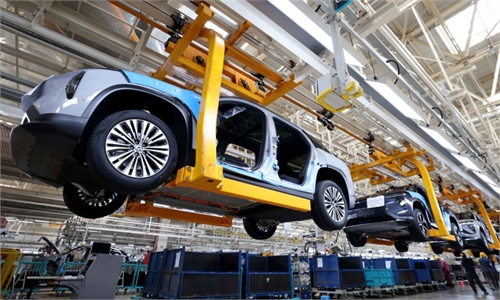
The skyline of Lujiazui in Shanghai Photo: CFP
It's almost 2024, and speculating how China's economy will fare next year has become one of the hottest topics among economists and media outlets, which are especially interested in predicting China's GDP growth.China's economic growth is expected to slow in the coming year to 4.6 percent, following a predicted 5.2 percent expansion this year, the Nikkei Asia reported on Tuesday, citing the latest survey conducted by Nikkei, Nikkei Asia and Nikkei Quick News.
While gloomy Western forecasts for China's economy may have triggered pessimistic market sentiment, their overemphasis on numbers suggests a fundamental lack of understanding of the country's economic development.
As the West tends to use Western theories to interpret China's economic performance, the conclusions are often at odds with reality.
We're not saying that statistics don't matter, but it's a tricky business to make forecasts about economic growth in a changeable world full of uncertainty.
This year saw global financial institutions and economists repeatedly revise their forecasts for the world economy and the Chinese economy, in response to unforeseen events, leading to repeated errors.
The world is in the midst of unprecedented changes, with frequent geopolitical conflicts and increased extreme weather events, contributing to more economic uncertainty and a sharp decline in the accuracy of those forecasts.
First, there's no denying that China's economy is under pressure. For starters, crises such as climate disasters, geopolitical tensions and confrontations have added difficulties for the world's economy to recover. The Paris-based Organization for Economic Cooperation and Development estimated last month that global growth would slow to 2.9 percent this year.
Second, the US and its Western allies have pursued a "decoupling" strategy to deconstruct global supply, industry and trade chains and rebuild them outside of China. The ill-intentioned interference in and containment of the development and progress of China's manufacturing sector and industrial upgrading has deteriorated the external environment for China's development.
Third, the Chinese economy is in the process of transforming toward high-quality development, with the growth model shifting from investment- and export-driven to relying on consumption, investment and exports.
A striking feature of the high-quality development stage is the increased emphasis on the optimization of the economic structure, especially on production and investment in high-tech fields.
But such structural transformation cannot be achieved overnight, and there are many difficulties and challenges to be overcome during the process, including addressing the problems accumulated in real estate and other fields. The Central Economic Work Conference held recently pointed out that China still faces difficulties and challenges, which include a lack of effective demand, overcapacity in some industries, weak social expectations and many hidden risks.
Even in the face of enormous pressure from changes in the economic environment at home and abroad, China's economy is still generally stable as it pushes forward with its transformation. For instance, electric vehicles, lithium batteries and solar cells have become China's new calling cards for exports.
There is every reason to be confident that China can withstand all these difficulties and pressures. One big reason is that China still has plenty of choices in its policy toolbox, with sufficient space for fiscal and monetary policy stimulus.
Due to the complicated economic situation at home and abroad, China has been cautious in using its policy tools, a choice that has been conducive to economic stability. While the objectives of different policy instruments may include price stability, employment, economic growth, the balance of payments and financial stability, the use of any specific instrument should serve the fundamental goal of stabilizing economic development, rather than serving one or several separate goals.
Only by maintaining economic stability can we guarantee the continuous strength for the Chinese economy to embark on a path of high-quality development.


